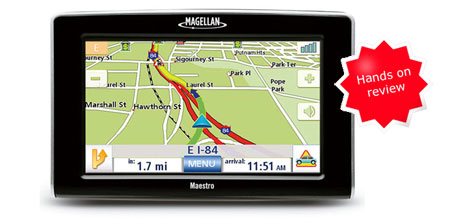
The Magellan Maestro 5310 is Magellan’s first GPS with a 5″ screen. It has preloaded maps of the U.S. and Canada, six million POIs and text-to-speech, so you’ll hear “approaching right turn, Maple Street” instead of just “approaching right turn.”
It also features live traffic (which I did not test) and AAA TourBook information, which I’ll discuss later in this review. It does not have Bluetooth for hands-free cell phone use, nor does it utilize voice commands like the Maestro 4250. To see how the 5310 stacks up against other units, check out my Magellan auto GPS comparison chart.
Compare prices on the Magellan Maestro 5310
There are many things to like about the Maestro 5310 interface. The 5″ color touch screen means larger fonts and buttons, which are always a welcome addition to any GPS. Magellan’s QuickSpell feature is here too, simplifying input by graying out invalid characters when spelling out an address.
Magellan Maestro 5310 interface
A slider bar on the right side of some menus makes it easy to quickly scroll through large lists, though it is not available on POI screens, where it could be very helpful.
Another nice feature is being able to enter cities by zip code. Previous cities are presented as an option when entering an address, but not when searching for POIs. I appreciated being able to access the volume controls from the map screen.
The 5310 has both favorites and an address book, allowing you a way to segregate more and less frequently visited destinations. You can reach the main menu from any menu screen by holding down the back button (though it says “cancel” when you do so, which could lead you to believe that it canceled the previous commands).
Magellan Maestro 5310 navigation
Unfortunately, there are some negatives associated with the interface that show up while navigating with the Maestro:
- You can’t search for a new destination without canceling the current route first. One exception is Exit POIs, which are discussed later.
- Key functions can require too many clicks. Though there is a home icon on the main menu, it takes three clicks to start navigating there. First you click the home icon, then you are presented with the screen below. Then you’ll get a screen asking you to choose your routing method (fastest time, shortest distance, least use of freeways, most use of freeways). If you have to cancel a route first, it takes six clicks to begin routing to home. (Screen shots courtesy of Magellan)
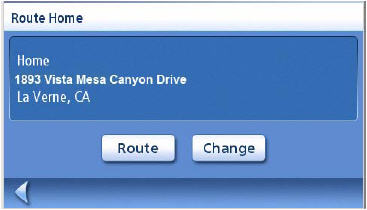
- The map does not switch to 2D automatically if you drag it to pan. You can pan
in 3D when navigating by tapping on the map, but it is not a very effective way to browse the map. To get to 2D mode, you must go into user settings. Using shortcuts like the slider bar and holding down the back button, it still took nine clicks for me to get back to the map screen when changing the mode to 2D. You can however pan in 2D when viewing a POI. One tip here — when panning the map, tap in the center of the cursor to route to a map point or to save it. - You cannot search for POIs along route, near your destination, or near a point on the map, but you can search for POIs near an address, a city or your current position.
- Previous destinations and My Addresses are found under “Enter Address.” You quickly get used to this but it is very unintuitive for the first time user.
- POI screens can also be confusing. Details for the highlighted POI in the image below show up at the top of the screen. But you can’t tap there to route to it. You must tap the highlighted item in the list. I’m curious as to why they didn’t set it up so you could tap the details area too.
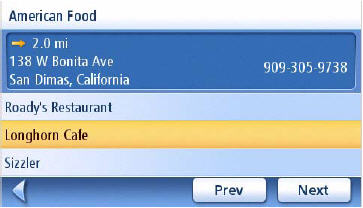
There are good things and bad things about being presented with route options each time you choose a destination (see screenshot below). On the one hand, it gives you a bit more control over preferred routes. Then again, it’s another click every time you want to route to a destination. It would be nice to have a way to opt out of this in the user settings.
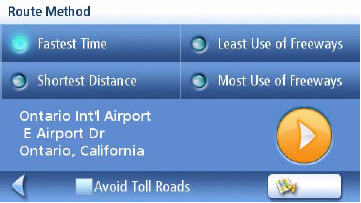
A split-screen appears as you approach a turn or series of turns as shown below. You can set your preferences so that this screen does not show, if so desired.
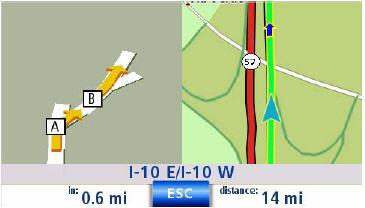
As you near the turn a chime sounds as a final reminder to turn. I found this feature helpful.
By tapping the next turn maneuver on the map screen (shown below), you can bring up the maneuver list.
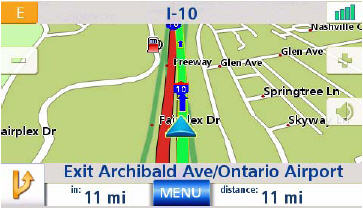
By selecting an individual maneuver (see below), you can (theoretically) exclude a road from the route.
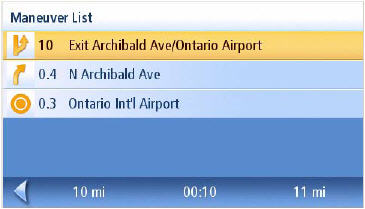
There are a couple of problems with this. One, if you want to exclude N. Archibald Ave. from the route, you would actually need to tap the item below it. Talk about counter-intuitive! Second, it didn’t work well for me. Sometimes , it would put me on the same road section I asked it to avoid, routing me to it in a different way. Other times it would send me way out of the way, avoiding a very direct alternative route.
The Maestro 5310 offers multi-destination routing, and has a “route optimization” feature. In actuality, the 5310’s multi-destination routing is little more than a way to store POIs and addresses for a particular trip. It does not automatically route you to the next destination.
Navigation glitches
I also noted the following during my testing:
- Route recalculation was very slow, among the slowest I have seen with a GPS unit.
- When entering an intersection for U.S. 19 and a local road, I had to enter the local road name first. It wouldn’t work if I did it the other way around. Also, I had to enter “US 19,” not just 19.
- The unit took me way out of the way at times, which appeared to be a glitch in the routing algorithm, and not due to the unit’s maps.
- On one trip, the unit had me a half-block off (where there was no street), paralleling the main thoroughfare I was on.
Exit POIs
The exit POI feature, designed to give you quick access to key POIs at upcoming freeway exits is very useful The only quibble I have is that it doesn’t list the exit number or highway name/number, it only shows the miles to the exit. To use exit POIs (available from page two of the main menu), simply tap a POI icon on the screen shown below.
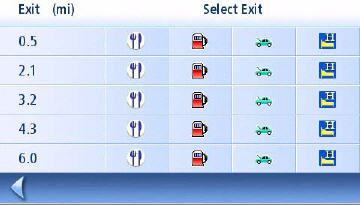
AAA – TourBook and more
AAA TourBook information rates five categories (accommodations, restaurants, destinations, attractions and events). Once you choose a POI, you’ll see a screen with multiple tabs of information. For restaurants these include types of cuisine, description, hours of operations, parking/credit cards accepted. Ratings go up to five diamonds and appear in gray or red, though there is no indication of what the color difference means. Cost is also indicated, ranging from $ to $$$$.
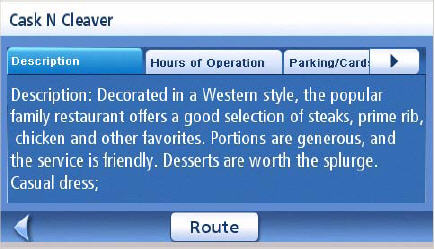
Other AAA POI searches include Show Your Card & Save, Approved auto repairs, AAA branch offices, and campgrounds.
Touching the wrecker icon on the main menu brings up a AAA roadside assistance screen which shows phone numbers for AAA roadside assistance and membership enrollment, and some basic information about your current location.
Magellan Maestro 5310 pros
- Includes a case and AC charger (the fit was loose on the latter, causing the unit to frequently transfer to battery power)
- Calls out that destination is on the right or left
- You can select categories of POIs to show on the screen tap them to route to them
- Includes a backup and restore function
- It is easy to both secure the unit into and release it from the mount
- The unit comes on automatically upon starting your car
- The 5″ screen with its large fonts and buttons is easy to read and use
- QuickSpell feature speeds data entry
- Allows for zip code entry in addition to spelling out city
- Address entry screens allow you to choose previous cities
- Can access volume control from map screen
- Bright screen is visible under sunny conditions
- Exit POIs is a useful feature
- You can customize automatic detour options that will kick in when you are sitting still in traffic (see image below)
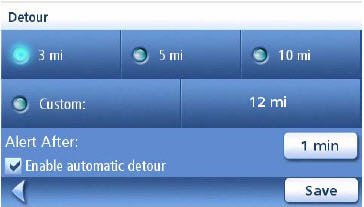
Magellan Maestro 5310 cons
- I experienced a number of lock ups, both when starting the unit and after it had been running for awhile. Pressing the recessed reset button always solved this, but I had to perform several resets while testing the device.
- Some zip codes are missing from database
- Cannot search for a new destination without canceling current route first
- Some key functions (e.g., navigating home) require too many clicks
- Difficult to change map mode to 2D to pan / browse the map
- Cannot search for POIs along route, near your destination, or near a point on the map
- Some menu items are unintuitive
- Maneuver exclusion feature does not work well
- Route recalculation is very slow
Conclusion
While there are a lot of good things about the Magellan Maestro 5310, there are also some significant negatives. Given that and the price of the unit, I cannot recommend it for purchase.
More Magellan Maestro 5310 reviews
- PC Magazine gives a 3.5 out of 5 star rating in their Magellan Maestro 5310 review
- Tech Talk has also posted a Magellan Maestro 5310 review
- Laptop Mag gives a 3-1/2 out of 5 star rating in their Magellan Maestro 5310 review
- Meanwhile, Computer Shopper gives a 6.2 out of 10 rating in their review of the Magellan 5310
- Boston.com reviewed the Magellan Maestro 5310, along with eight other units
- JusTech’n has posted their own Magellan Maestro 5310 review
- I’ll be posting more hands on GPS reviews as they appear, but in the meantime, here are some…
Other Magellan Maestro 5310 resources
- A PDF version of the Magellan Maestro 5310 owners manual.
- A Magellan Maestro 5310 FAQ.
- Want to see how the Maestro 5310 stands up against other units? Use this handy Magellan auto GPS comparison chart.
- Our other Magellan Maestro reviews.
- There is a Magellan Maestro message forum at GpsPasSion.
- And there is a Magellan GPS message forum at Yahoo, and an alt.satellite.gps.magellan UseNet group.
- The official Magellan Maestro 5310 web page.
Compare prices on the Magellan Maestro 5310 at these merchants:
- Check the current Magellan Maestro 5310
price at Amazon.
- Get the
Magellan Maestro 5310 Large-Screen Automotive Navigation System with Traffic
at TigerGPS, where shipping is free on orders over $250.
- Get the Magellan Maestro 5310 for an amazing price on eBay.

For someone like me who is forever getting lost while driving to new places, this device is a life-saver. The text-to-speech feature is a particular favorite of mine.
I got my magellan gps at http://www.consumerdepot.com
Hello,
I just returned from Oahu Hawaii and brought our Megellan Maestro 5310 and tried putting in Hawaii addresses and Hawaii maps were not there. We ended up renting a car and purchasing the GPS with it. According to the product descriptions above, the maps of US and Canada is suppose to be preloaded into the GPS. Is this correct? If not, how do I load maps for Hawaii, Alaska and Canada into the GPS? Should I return my GPS to where I purchased it?
Thank you!
May
Yes, Magellan’s website says the maps should be there…
http://www.magellangps.com/products/product.asp?prodID=2011&SEGID=408&tab=1&ajaxlink=2011:features
I wonder if you need to go into settings and enable them. If so, it’s pretty lame.
thank you. I found it now. Good to know the next time.